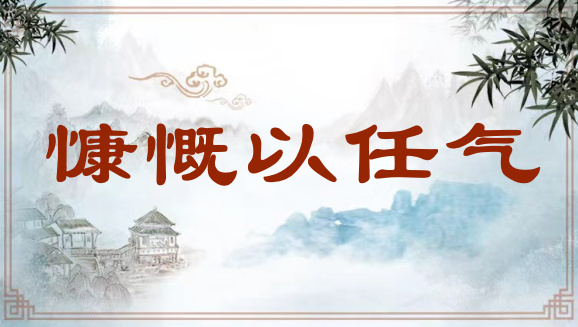The Passionate Spontaneous Manifestation of the Heroic Spirit

慷慨激昂地抒发豪气、意气。这是南朝刘勰在《文心雕龙·明诗》中对汉末建安时期文学风格特征的概括。建安时期的作家充分施展才华,表现自我,用作品发出深长慨叹,抒发或唤起豪气,在放飞自我的同时倾吐内心的不平之气、不屈之心和不凡之志。刘勰以“气”论述建安文学——当“气”作为精神生命的原动力在文艺创作中得以充分发挥,就能形成慷慨激昂的文风。个体精神充分发挥而不受制约,也意味着文人生命意识的觉醒、主体意识的自觉。
The term was first proposed by the Southern Dynasties literary critic Liu Xie in The Literary Mind and the Carving of Dragons as a summary of the prevailing literary style in the Jian'an era at the end of the Han Dynasty. Through their works, the literary figures of the era gave free play to their talent in expressing their deep sorrows, frustration, and indignation while articulating their ambition, enthusiasm, pride, and tenacity. Running through their literature, Liu Xie observed, was a powerful spirit — the drive of their spiritual being that manifested itself in their literary creation as a passionate writing style. The spontaneous free overflow of the individual writer's sentiments reflected an awareness of the impermanence of life, a heightened consciousness of the self, and a deep recognition of their agency and creativity.
引例 Citations:
◎慷慨以任气,磊落以使才。(刘勰《文心雕龙·明诗》)
慷慨激昂地抒发豪气,洒脱直率地施展才情。
Their poems were the passionate spontaneous manifestation of their heroic spirit and the free and easy display of their literary talent. (Liu Xie: The Literary Mind and the Carving of Dragons)
◎露才而扬己,慷慨以任气。(周亮工《朱静一诗序》)
显露才能而充分表现自己,慷慨激昂地抒发自己的豪气。
His works gave full expression to his talents and manifested his passionate and heroic spirit. (Zhou Lianggong: Preface to Zhu Jingyi's Poems)
推荐:教育部 国家语委
供稿:北京外国语大学 外语教学与研究出版社
责任编辑:钱耐安





